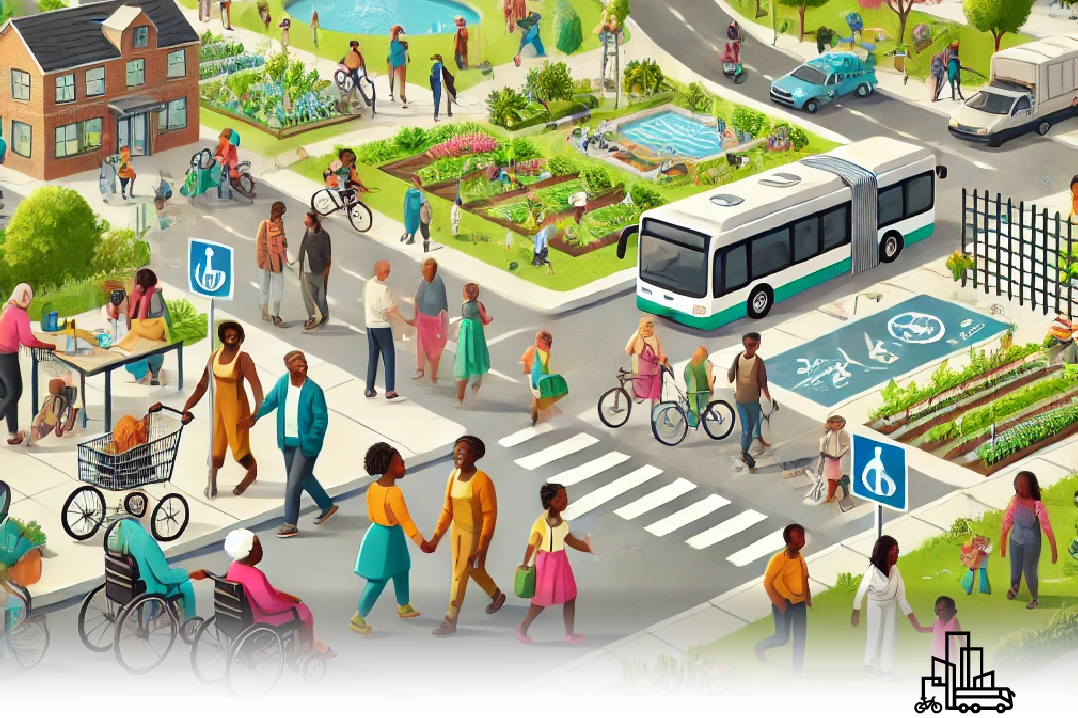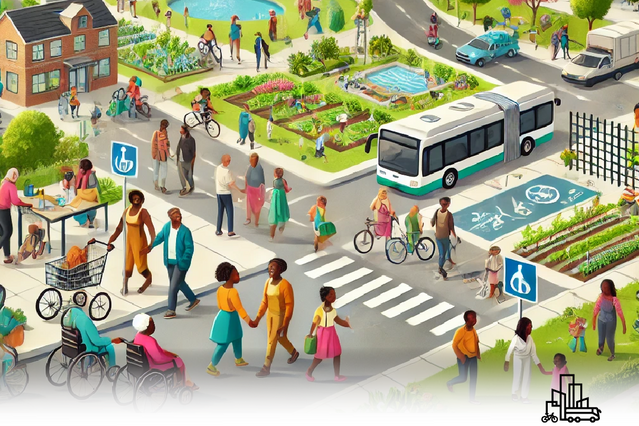Just City Principles
Imagine a city where everyone—regardless of their background—has equal access to opportunities and services that promote a dignified life. A "just city" is built on the principles of Diversity, Equity, and Inclusion (DEI), ensuring that all residents enjoy decent work, health, education, and housing, free from the barriers of race, gender, or socio-economic status. This vision champions dignity for all, especially those in informal areas, while promoting democracy by involving diverse voices in urban planning. Safety, accessibility, affordability, and sustainability are cornerstones of this city, creating a vibrant, inclusive urban environment for current and future generations.
Here is the brief overview of the principles on which Just City stands:
- Diversity, Equity and Inclusion (DEI) – this principle calls for equitable access to opportunities (decent work) and services (health, transport, education, housing) for all city residents regardless of their race, gender, socio-economic status or ethnicity. In a just city we focus on fighting the intersections of oppression, i.e. combined inequalities.
- Dignity – often, informality is stigmatized which is why we want dignity to be the fundamental principle that underlies both human rights-based approaches and our equity work. It implies respect for and recognizing residents of informal areas as equal citizens.
- Democracy – this call for urban planning and decision-making processes which embraces participation. It seeks to envision a city whose planning and implementation incorporates voices, perspectives and experiences from diverse social groups in urban areas.
- Public Safety – this call for a city with physical safety, adequate space and protection along with social safety mechanisms for all residents with a particular emphasis on groups at risk such as women, elderly people, children and peoples living with disability(ies). Safety challenges need context-specific responses, reduced inequality and the inclusion of communities.
- Accessibility and Affordability – the relevance of access and affordability cannot be underestimated in a ‘just city’. For example, a feminist city will have gender-responsive public services.
- Sustainability – a sustainable and people-centered city is designed to meet and address the current challenges without endangering the future prospects of the planet. This includes amongst others the sustainable use of land, sustainable infrastructure and transport.
Learn more about the Just City pillars from the Just City website.

Imagine a city where everyone—regardless of their background—has equal access to opportunities and services that promote a dignified life. A "just city" is built on the principles of Diversity, Equity, and Inclusion (DEI), ensuring that all residents enjoy decent work, health, education, and housing, free from the barriers of race, gender, or socio-economic status. This vision champions dignity for all, especially those in informal areas, while promoting democracy by involving diverse voices in urban planning. Safety, accessibility, affordability, and sustainability are cornerstones of this city, creating a vibrant, inclusive urban environment for current and future generations.
Here is the brief overview of the principles on which Just City stands:
- Diversity, Equity and Inclusion (DEI) – this principle calls for equitable access to opportunities (decent work) and services (health, transport, education, housing) for all city residents regardless of their race, gender, socio-economic status or ethnicity. In a just city we focus on fighting the intersections of oppression, i.e. combined inequalities.
- Dignity – often, informality is stigmatized which is why we want dignity to be the fundamental principle that underlies both human rights-based approaches and our equity work. It implies respect for and recognizing residents of informal areas as equal citizens.
- Democracy – this call for urban planning and decision-making processes which embraces participation. It seeks to envision a city whose planning and implementation incorporates voices, perspectives and experiences from diverse social groups in urban areas.
- Public Safety – this call for a city with physical safety, adequate space and protection along with social safety mechanisms for all residents with a particular emphasis on groups at risk such as women, elderly people, children and peoples living with disability(ies). Safety challenges need context-specific responses, reduced inequality and the inclusion of communities.
- Accessibility and Affordability – the relevance of access and affordability cannot be underestimated in a ‘just city’. For example, a feminist city will have gender-responsive public services.
- Sustainability – a sustainable and people-centered city is designed to meet and address the current challenges without endangering the future prospects of the planet. This includes amongst others the sustainable use of land, sustainable infrastructure and transport.
Learn more about the Just City pillars from the Just City website.
